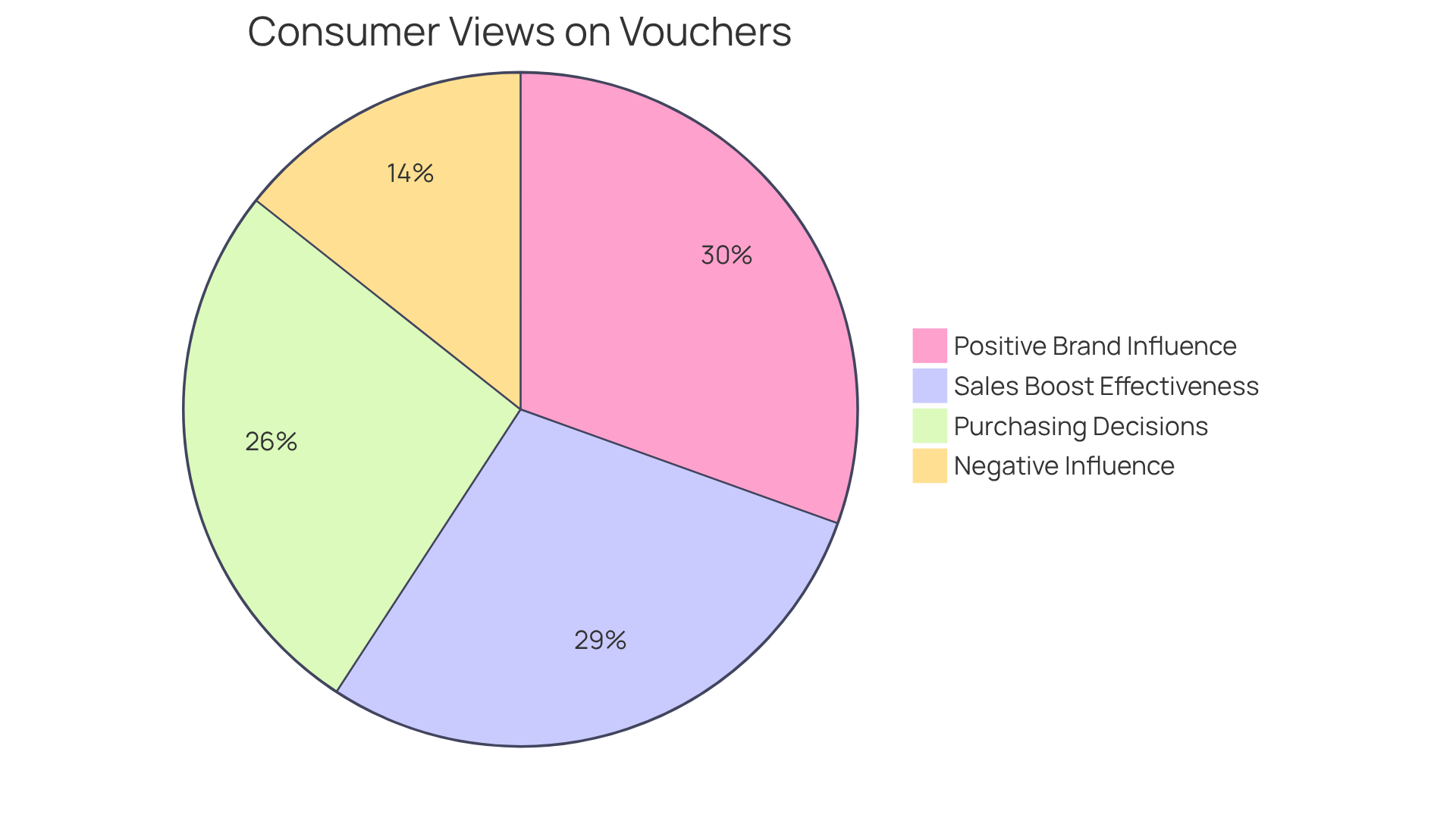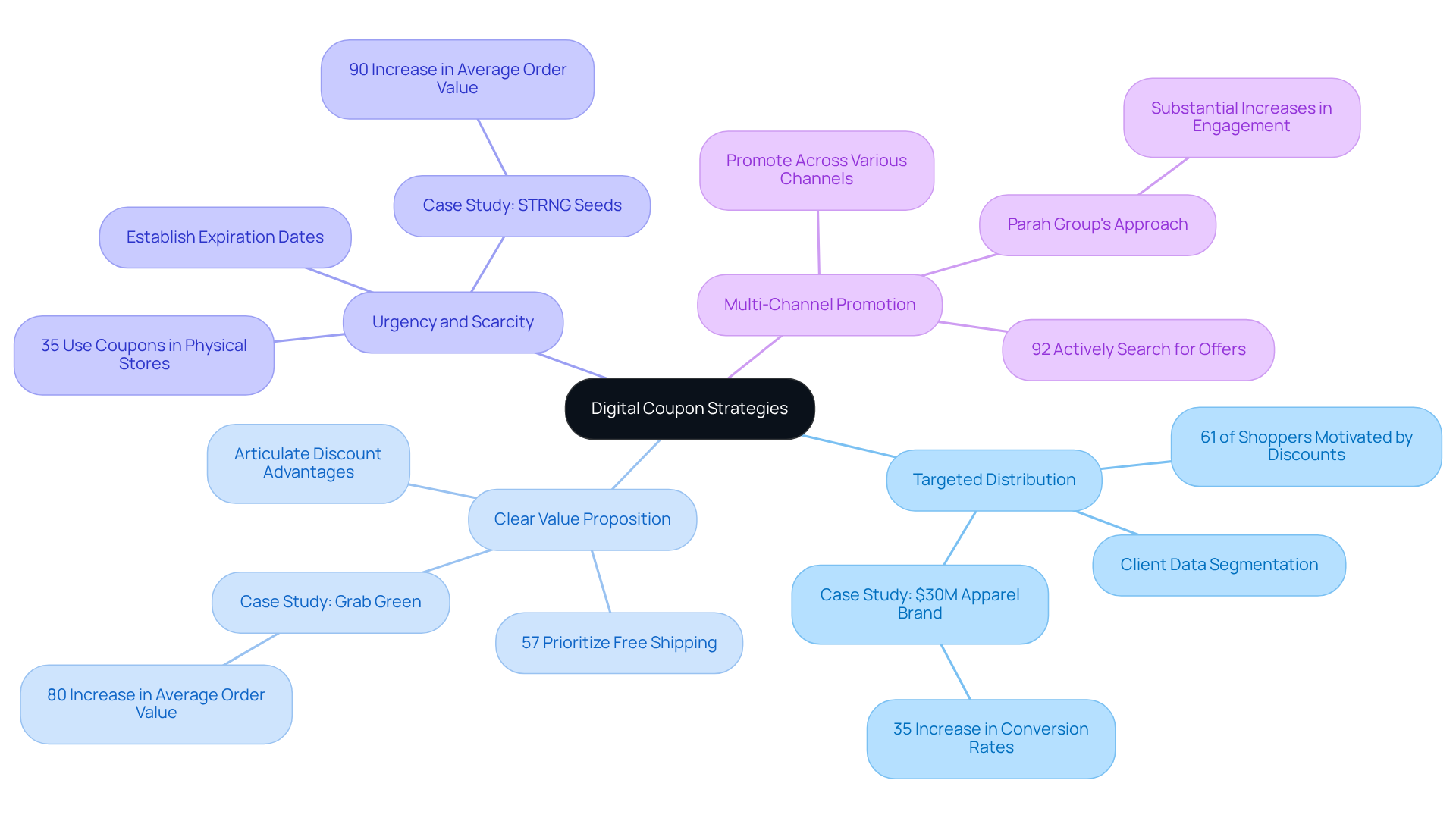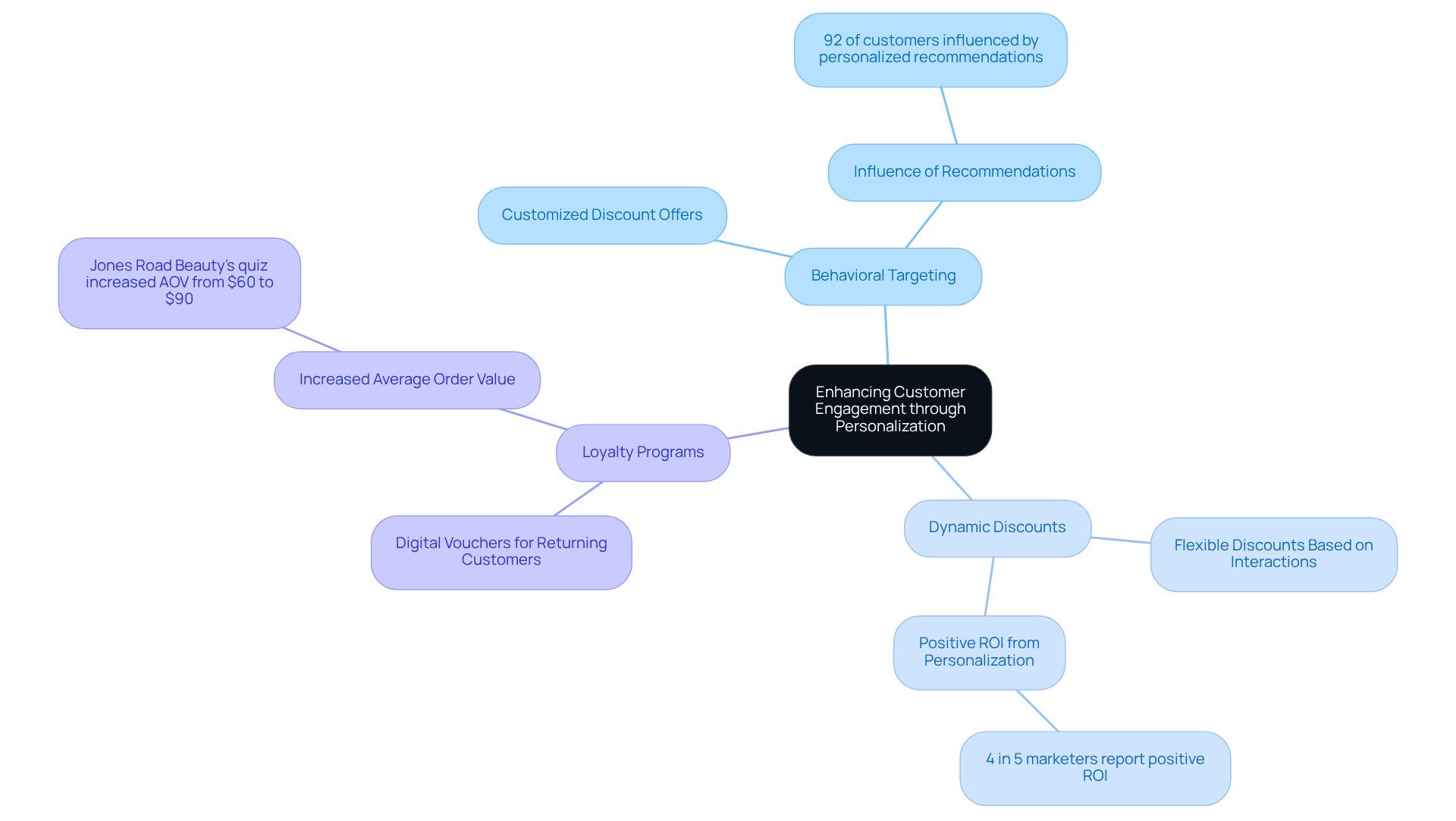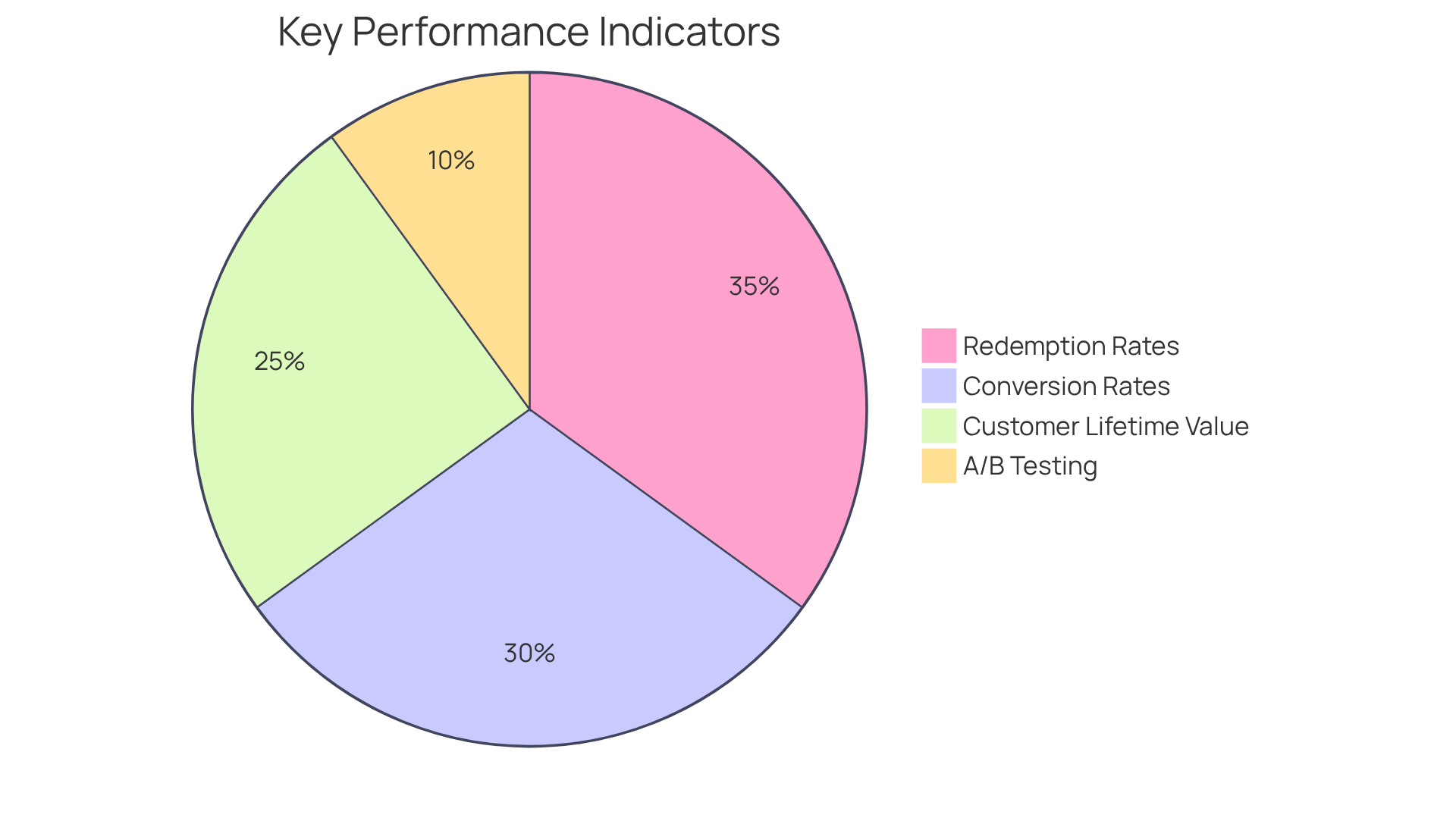
Overview
This article addresses best practices for effective digital coupon marketing, specifically tailored for direct-to-consumer (DTC) brands. It outlines key strategies, including:
- Targeted distribution
- Clear value propositions
- Creating urgency
- Leveraging multi-channel promotion
These methods are substantiated by data that illustrates how they can significantly enhance customer engagement, boost conversion rates, and improve overall sales performance.
Introduction
The landscape of consumer shopping is undergoing a profound transformation, with digital coupons emerging as essential tools for direct-to-consumer (DTC) brands. These electronic vouchers are evolving from mere discounts into sophisticated marketing instruments, presenting companies with the opportunity to enhance customer loyalty and drive sales.
However, as competition intensifies in the digital marketplace, brands must ask themselves: how can they effectively leverage these coupons to not only attract but also retain customers? By exploring best practices in digital coupon marketing, brands can unlock strategies that foster engagement and conversion, ensuring they not only keep pace but thrive in this dynamic environment.
Understand the Evolution and Importance of Digital Coupons
Electronic vouchers have undergone a remarkable transformation, evolving from traditional paper formats to advanced online solutions that are both easily disseminated and tracked. This evolution is driven by technological advancements and a notable shift in consumer preferences, as more shoppers gravitate towards the convenience and immediacy of online options.
By 2025, electronic vouchers have transcended mere discounts; they serve as strategic instruments that not only enhance customer loyalty but also drive traffic and elevate average order values (AOV). For direct-to-consumer (DTC) companies, grasping this evolution is crucial for effectively leveraging online vouchers.
These tools empower companies to utilize digital coupon marketing to craft personalized experiences that resonate with consumers, ultimately resulting in improved conversion rates. As consumer expectations shift towards seamless, engaging, and rewarding shopping experiences, businesses that utilize digital coupon marketing in their strategies stand to gain a competitive edge in the marketplace.
Research indicates that:
- 68% of consumers believe electronic vouchers positively influence a retailer's brand.
- 59% assert that these vouchers significantly affect their purchasing decisions.
- 64% of US retail media decision-makers view online vouchers as effective sales boosters, underscoring their importance.
This underscores the critical role of electronic vouchers in and fostering loyalty within the DTC landscape.

Implement Effective Strategies for Digital Coupon Campaigns
To implement effective digital coupon campaigns, DTC brands must adopt the following strategies:
- Targeted Distribution: Leverage client data to segment your audience effectively. By implementing digital coupon marketing to distribute vouchers to targeted groups, companies can ensure that the appropriate offers reach the right clients, significantly enhancing conversion chances. Studies reveal that 61% of shoppers are motivated to explore new products through discounts, underscoring the importance of focused marketing. For instance, a $30M apparel brand collaborated with Parah Group to redesign their homepage, incorporating targeted promotions that highlighted social proof, which resulted in a 35% increase in conversion rates.
- Clear Value Proposition: Clearly articulate the advantages of the discount. Whether offering a percentage discount, free shipping, or a buy-one-get-one deal, the value must be immediately apparent to entice customers. A well-defined value proposition can improve redemption rates, as 57% of consumers prioritize free shipping offers. In a case study with Grab Green, a $15M cleaning product brand, implementing clear value propositions through bundles and multi-packs led to an 80% increase in average order value (AOV).
- Urgency and Scarcity: Instill a by establishing expiration dates or limiting the number of available vouchers. This tactic can motivate customers to act swiftly, thereby reducing cart abandonment. Research indicates that 35% of shoppers utilize digital coupon marketing while making purchases in physical stores, suggesting that prompt deals can stimulate quick transactions. Parah Group's collaboration with STRNG Seeds, a cannabis brand, included strategies that created urgency through limited-time offers, resulting in a 90% increase in AOV.
- Multi-Channel Promotion: Promote digital vouchers across various channels, including email, social media, and your website. This broadens your reach and ensures that more prospective clients are aware of the available offers. Efficient distribution channels can significantly improve deal visibility, with 92% of consumers actively searching for offers while shopping. The successful execution of multi-channel strategies, particularly through digital coupon marketing, has been a hallmark of Parah Group's approach, leading to substantial increases in engagement and sales.
By implementing these strategies, DTC companies can elevate their online voucher campaigns, enhancing engagement and conversion rates while fostering client loyalty.

Leverage Personalization to Enhance Customer Engagement
Personalization in digital promotion marketing can dramatically enhance consumer engagement for DTC brands. To maximize effectiveness, consider the following approaches:
- Behavioral Targeting: Examine client behavior and preferences to customize discount offers. For instance, if a client frequently purchases skincare items, sending them a voucher for a similar product can significantly increase the likelihood of conversion. A study reveals that 92% of clients are influenced to buy a product due to personalized recommendations in their shopping carts, underscoring the effectiveness of this targeted approach.
- Dynamic Discounts: Leverage technology to create flexible discounts that adapt based on client interactions. For example, a client who has abandoned their cart could receive a tailored discount to encourage them to complete their transaction. This timely intervention can considerably enhance promotional effectiveness and drive sales. According to Adobe, approximately 4 in 5 marketers report a positive ROI when utilizing personalization in their campaigns.
- Loyalty Programs: Integrate digital vouchers into loyalty initiatives, rewarding returning patrons with exclusive deals. This strategy not only incentivizes purchases but also cultivates a sense of belonging and appreciation among customers. A case study from Jones Road Beauty illustrates this point, where their quiz increased the average order value from $60 to $90, highlighting the potential impact of personalized strategies.
By implementing these practices, DTC companies can effectively harness the power of personalization to elevate their coupon marketing strategies. However, it is essential to avoid overwhelming consumers with excessive personalization; 79% of consumers express discomfort with companies that request excessive personal data. Ultimately, applying these strategies can lead to and increased sales, as 80% of consumers are more inclined to purchase from companies that provide personalized interactions.

Measure and Optimize Coupon Marketing Performance
To ensure the success of online promotion initiatives, DTC companies must rigorously assess and enhance their campaigns. Key performance indicators (KPIs) to track include:
- Redemption Rates: It is essential to monitor the percentage of distributed vouchers that are redeemed. A low redemption rate may indicate that the offer lacks appeal or fails to reach the intended audience. With digital vouchers averaging a redemption rate of 7% or higher—marking the first increase since 2008—brands should aim to exceed this benchmark.
- Conversion Rates: Analyzing the conversion rates of clients who utilize discounts compared to those who do not is crucial. This comparison reveals the impact of discounts on overall sales, with studies demonstrating that discount users typically exhibit higher conversion rates than non-users. Collaborating with an expert CRO agency such as Parah Group can further enhance these conversion rates, as they focus on strategies that prioritize profitability and sustainable growth.
- Customer Lifetime Value (CLV): It is vital to evaluate how discount usage influences the long-term value of customers. Understanding whether discount users are more likely to return for future purchases can significantly .
- A/B Testing: Regularly conducting A/B tests on various discount strategies is imperative to identify which offers resonate most with your audience. This iterative approach promotes continual enhancement, enabling companies to refine their promotional campaigns based on real-time data and consumer behavior insights. Notably, email-delivered promotions often achieve redemption rates of 10-15% when sent to engaged subscriber lists, underscoring the potential effectiveness of A/B testing.
By focusing on these KPIs and monitoring metrics such as redemption rates, DTC brands can enhance their promotional marketing effectiveness and foster sustainable growth. Furthermore, with 70% of digital coupons being redeemed via mobile, it is crucial to optimize coupon strategies for mobile users. Brands must also exercise caution against over-discounting, as this can lead to customer confusion and diminish the perceived value of their offers.

Conclusion
Digital coupon marketing has evolved into an essential asset for direct-to-consumer (DTC) brands, transitioning from basic discounts to strategic tools that enhance customer loyalty and drive sales. This evolution is critical for brands that aspire to create personalized and engaging shopping experiences that align with contemporary consumer expectations. By effectively leveraging digital coupons, DTC companies can significantly boost conversion rates and establish a competitive advantage in a swiftly changing marketplace.
The article outlines four best practices that are crucial for successful digital coupon marketing:
- Targeted distribution to reach the appropriate audience
- Clear value propositions to attract customers
- Urgency and scarcity to prompt immediate action
- Multi-channel promotion to enhance visibility
Furthermore, personalization is fundamental in elevating customer engagement, with techniques such as behavioral targeting and dynamic discounts proving effective in driving conversions. Measuring performance through key indicators, including redemption rates and customer lifetime value, ensures that campaigns remain effective and aligned with overarching business objectives.
In an environment where consumer preferences are in constant flux, DTC brands must recognize the power of digital coupon marketing not merely as a sales tactic, but as a strategy to cultivate enduring relationships with their customers. By implementing these best practices and prioritizing personalization, brands can foster meaningful interactions that resonate with consumers, ultimately resulting in enhanced loyalty and sustained growth. The future of digital coupons is promising, and those who invest in understanding and optimizing their strategies will be strategically positioned to excel in the evolving retail landscape.
Frequently Asked Questions
How have electronic vouchers evolved over time?
Electronic vouchers have transformed from traditional paper formats to advanced online solutions that are easily disseminated and tracked, driven by technological advancements and a shift in consumer preferences towards online options.
What role do digital coupons play for DTC companies by 2025?
By 2025, digital coupons will serve as strategic instruments that enhance customer loyalty, drive traffic, and elevate average order values (AOV) for direct-to-consumer (DTC) companies.
How do digital coupons impact consumer behavior?
Digital coupons empower companies to create personalized experiences, leading to improved conversion rates as they meet consumer expectations for seamless, engaging, and rewarding shopping experiences.
What percentage of consumers believe electronic vouchers positively influence a retailer's brand?
68% of consumers believe that electronic vouchers positively influence a retailer's brand.
How do electronic vouchers affect purchasing decisions?
59% of consumers assert that electronic vouchers significantly affect their purchasing decisions.
What do retail media decision-makers think about online vouchers?
64% of US retail media decision-makers view online vouchers as effective sales boosters, highlighting their importance in the market.
FAQs











